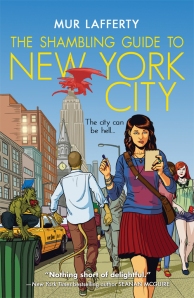MICHAEL A. VENTRELLA: I’m pleased to be interviewing Lucas Mangum today. Lucas and I met years ago when we both took a writing course from NY Times Bestselling author Jonathan Maberry. I am very pleased to see where he is today! Lucas Mangum used to live in the Philly area but has relocated to Austin. He enjoys wrestling, cats, wrestling with cats, and drinking craft beer while crafting weird stories. Follow him on Twitter @LMangumFiction and talk books and horror movies, or visit his website here. 
Lucas! Tell us about the plot of FLESH AND FIRE.
LUCAS MANGUM: FLESH AND FIRE is exactly the kind of book I’ve always wanted to write. It’s a little bit supernatural horror, a little bit romance, a little bit dark fantasy. The story follows Todd, who, thirty years ago, left the love of his life to die, for the life he thought he wanted. Now, in the midst of a midlife crisis, he is haunted by her memory. When Chloe escapes Hell in search of the peaceful rest that has eluded her, a demon named Samael is on her trail and she needs Todd’s help. While on the run Todd and Chloe face demons real and personal, soul-threatening danger, and their long-buried feelings for each other.
VENTRELLA: What is the Doubledown Series about?
MANGUM: I am so glad you asked that, because it’s not a series in the sense that the stories are connected at all. The Doubledown Series is inspired by the old Ace Doubles series, where two books are released together as one. The cool part about this series is that Journalstone, the publisher, will pair a veteran writer with an up and comer. FLESH AND FIRE is packaged with DARK OF NIGHT, a brand new zombie adventure by Jonathan Maberry and Rachael Lavin.
VENTRELLA: All genres have formulas in some manner – readers expect certain things when they read a mystery or a romance. What do readers expect in a horror novel?
MANGUM: That’s a tough question, because horror has a lot of subgenres. I guess the ultimate goal of a horror novel is to unsettle or stir up dread in the reader (Douglas E. Winter said, “Horror isn’t a genre, but an emotion), but depending on the subgenre, the reader will get there differently. Extreme horror tends to rely on gory descriptions to inspire that dread. Survival horror achieves dread by emphasizing isolation and images of collapsed society. Psychological horror explores the darker areas of the human mind. And so on.
VENTRELLA: What was the best lesson you learned from Jonathan Maberry?
MANGUM: You were probably there when I learned it. I think starting out, you know, the idea of writing a book can be very overwhelming. Jonathan told us, on that first day of that novel class, about focusing on how many words you can realistically do in a day and just kind of take things from there. That writing a book is like anything in life, in that it takes a daily commitment, may seem overly simplistic, but for me, it was exactly what I needed to hear at the time. I did finish that novel, but I never shopped it, because it was a first novel in every sense of the term. I’m sure we all have those buried on our hard drives. I ended up writing the first draft of FLESH AND FIRE in three weeks, not long after the sixth draft of that initial piece.
VENTRELLA: What are some of your upcoming projects?
MANGUM: I’m currently working on a sequel of sorts to FLESH AND FIRE, called BLOOD AND BRIMSTONE.  Without going too much into spoilers, it follows the kids of FLESH AND FIRE’s protagonist as they try to make sense of what happened in the first book. I’ve also got a balls to the wall supernatural horror novel called, WE ARE THE ACCUSED, that I’m excited about. It has some of the most intense scenes I’ve ever written, I think.
Without going too much into spoilers, it follows the kids of FLESH AND FIRE’s protagonist as they try to make sense of what happened in the first book. I’ve also got a balls to the wall supernatural horror novel called, WE ARE THE ACCUSED, that I’m excited about. It has some of the most intense scenes I’ve ever written, I think.
VENTRELLA: Do you think readers want to read about “believable” characters or do they really want characters that are “larger than life” in some way?
MANGUM: As a reader (and all writers better be readers too), I like characters who are down-to-earth, even average, but have moments in which they perform larger than life feats because they have something they care about, and that something is either threatened or somehow out of reach. I think that’s both interesting to read about and believable.
VENTRELLA: What is your writing process? Do you outline heavily or just jump right in, for instance?
MANGUM: My process is finicky. If I accidentally outline too much, and end up knowing everything about the story, I get so bored, I can’t bring myself to actually write the story. If I don’t outline at all, I’m apt to write myself into a corner around the end of the first act or so. What I’ve found works best for me is knowing the big moments, and by that I mean the turning points, so that I end up with not so much an outline as a series of goals for the characters to be aiming for. Sometimes those goals change during the first draft as journeys can have detours, but I like to at least know where I want to go, and then I worry about the means of transportation later. It allows me to be spontaneous, but not directionless.
VENTRELLA: Do you think short stories are harder to write than novels?
MANGUM: Oh, definitely. While my outlines for novels tend to be vague, I am more likely to do a detailed outline of a short story, because there is just less space to work in, and you need to nail down what you want to say a lot quicker, whereas with a novel, you can afford to let the piece wander a bit (provided that where you wander is compelling).
VENTRELLA: What’s your opinion on self-publishing?
MANGUM: Nowadays, I have no problem with it. I think if you’re the kind of person who likes to have control of your book from its inception to its publication, you should go for it. It’s so much cheaper than it used to be. That said, you should still be willing to fork over some money. Make sure your cover is professional. Make sure your book is edited (and not just by your buddy from English class, but a real editor). If your goal is to sell books, you have to be prepared to spend more time marketing than writing your next piece, unless you can afford to hire someone, which, if you’re writing, you probably can’t. And just because you’re indie, you should still be going to cons and meeting people. You should still be doing events. You should still be publicizing yourself on social media and blogs. If you have the personality where you can take it all on, go for it. I know that I, personally, am not that guy. I’m always thinking two, sometimes three books ahead, and while I’m perfectly fine marketing myself, I would much rather be writing. Even when I go to cons, I’ll spend most of the day in my room reading or writing and only really come out for the parties. Everyone knows that’s where all the real networking is done anyway.
Long story short, I have the utmost respect for anyone who can self-publish and still produce a professional product, but me, I don’t know anything about book design, don’t trust myself to see everything a professional editor won’t, and would much rather be writing than marketing, so self-publishing is definitely not for me.
VENTRELLA: What sort of advice would you give an un-agented author with a manuscript?
MANGUM: If you don’t have an agent, and you want one, know the agent to who you are pitching your project. Visit their website, read the stuff they’ve represented, and try to meet them if you can. The same applies if you want to forgo an agent and go directly to a publisher. Know your audience. You, hopefully, wouldn’t make dick jokes in front of your mother-in-law, so you shouldn’t pitch your 140,000 word epic fantasy to someone who reps literary fiction.
Reminds me of another bit of advice I got from Jonathan: not everyone will want to read your book, and that’s okay. Your audience isn’t everybody. That’s not realistic. Find out who reads stuff that’s similar to what you do and talk to them. Yeah, I know, you’re unique and your book is unlike anything ever written. I know that feeling. Best case scenario is to let that sentiment go. If you can’t, find something about your story that helps you place it. Hell, I was worried FLESH AND FIRE, a horror novel with a strong romantic element, was unmarketable, but it sold, so I’m someone out there wants to read it.
VENTRELLA: What’s the best piece of writing advice you ever got?
MANGUM: Don’t quit your day job, because writing seldom provides a steady paycheck, and never offers health insurance.
VENTRELLA: With a time machine and a universal translator, who would you invite to your ultimate dinner party?
MANGUM: Stanley Kubrick. That man’s mind never ceases to amaze me. I discover different things in his films every time I watch them.
Filed under: writing | Tagged: agents, Flesh and Fire, Jonathan Maberry, Lucas Mangum, self-publishing, short stories, writing advice | 1 Comment »


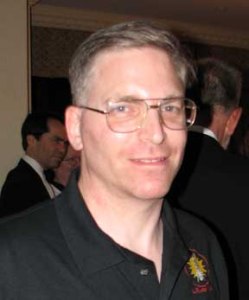 The novel covers the election for president of Earth in the year 2100, when the world has adopted the American two-party electoral system. A father decides to buck the system and run for president of Earth, taking on his own daughter with a third-party moderate challenge – with an incredulous alien ambassador along for the ride.
The novel covers the election for president of Earth in the year 2100, when the world has adopted the American two-party electoral system. A father decides to buck the system and run for president of Earth, taking on his own daughter with a third-party moderate challenge – with an incredulous alien ambassador along for the ride.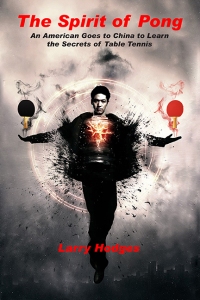 I began writing coaching articles, and then books on table tennis. I was hired as director and a coach for table tennis at the Olympic Training Center in Colorado Springs, and between training sessions, I began to write SF. I now have over 1600 published articles and eleven books – seven table tennis, five SF/fantasy, which adds up to twelve since one is a table tennis fantasy novel.
I began writing coaching articles, and then books on table tennis. I was hired as director and a coach for table tennis at the Olympic Training Center in Colorado Springs, and between training sessions, I began to write SF. I now have over 1600 published articles and eleven books – seven table tennis, five SF/fantasy, which adds up to twelve since one is a table tennis fantasy novel.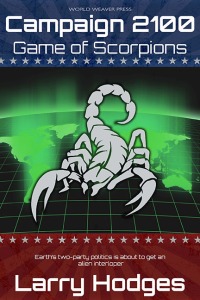 (She’s practically a superhero, and so throughout the novel she is showcased doing over-the-top things.) We get a flashback history lesson on how she shot and killed the Russian lead general, took command of Russian troops, and led them to a surprising victory. Feodora originally wasn’t intended to be a major character, but when she first appeared halfway through the book in the first draft, she pretty much took over, dominating the story whenever she appeared. At the behest of critiquers, I rewrote the story so she could appear sooner. I also had to send her on various journeys to get her off the stage so the other characters could get attention!
(She’s practically a superhero, and so throughout the novel she is showcased doing over-the-top things.) We get a flashback history lesson on how she shot and killed the Russian lead general, took command of Russian troops, and led them to a surprising victory. Feodora originally wasn’t intended to be a major character, but when she first appeared halfway through the book in the first draft, she pretty much took over, dominating the story whenever she appeared. At the behest of critiquers, I rewrote the story so she could appear sooner. I also had to send her on various journeys to get her off the stage so the other characters could get attention!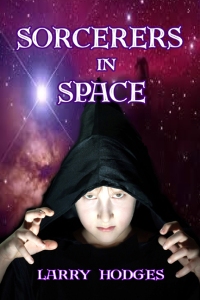 This is now some top writers operate, such as Connie Willis, who is famous for doing detailed outlines of every chapter – and then writing the novel out of sequence, writing whichever chapter she feels like writing that day. And she’s won more major awards than any other SF writing – eleven Hugos and seven Nebulas. The other extreme would be a writer like Stephen King, who only has a vague idea what he’s writing about when he starts, and often writes a huge amount before he figures out what the story is about. Another example might be Isaac Asimov, who often started with a general idea of what the story would be, and with an ending, and then wrote to that end.
This is now some top writers operate, such as Connie Willis, who is famous for doing detailed outlines of every chapter – and then writing the novel out of sequence, writing whichever chapter she feels like writing that day. And she’s won more major awards than any other SF writing – eleven Hugos and seven Nebulas. The other extreme would be a writer like Stephen King, who only has a vague idea what he’s writing about when he starts, and often writes a huge amount before he figures out what the story is about. Another example might be Isaac Asimov, who often started with a general idea of what the story would be, and with an ending, and then wrote to that end.














